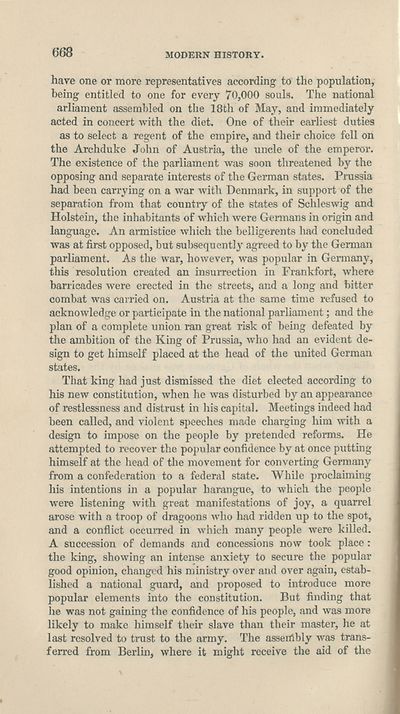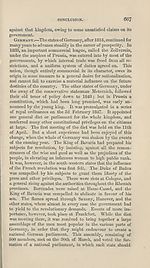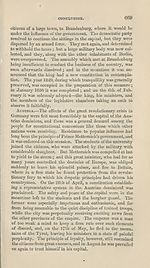Download files
Complete book:
Individual page:
Thumbnail gallery: Grid view | List view

MODERN HISTORY.
have one or more representatives according to the population,
being entitled to one for every 70,000 souls. The national
arliament assembled on the 18th of May, and immediately
acted in concert with the diet. One of their earliest duties
as to select a regent of the empire, and their choice fell on
the Archduke John of Austria, the uncle of the emperor.
The existence of the parliament was soon threatened by the
opposing and separate interests of the German states. Prussia
had been carrying on a war with Denmark, in support of the
separation from that countiy of the states of Schleswig and
Holstein, the inhabitants of which were Germans in origin and
language. An armistice which the belligerents had concluded
was at first opposed, but subsequently agreed to by the German
parliament. As the war, however, was popular in Germany,
this resolution created an insurrection in Frankfort, where
barricades were erected in the streets, and a long and bitter
combat was carried on. Austria at the same time refused to
acknowledge or participate in the national parliament; and the
plan of a complete union ran great risk of being defeated by
the ambition of the King of Prussia, who had an evident de¬
sign to get himself placed at the head of the united German
states.
That king had just dismissed the diet elected according to
his new constitution, when he was disturbed by an appearance
of restlessness and distrust in his capital. Meetings indeed had
been called, and violent speeches made charging him with a
design to impose on the people by pretended reforms. He
attempted to recover the popular confidence by at once putting
himself at the head of the movement for converting Germany
from a confederation to a federal state. While proclaiming
his intentions in a popular harangue, to which the people
were listening with great manifestations of joy, a quarrel
arose with a troop of dragoons who had ridden up to the spot,
and a conflict occurred in which many people were killed.
A succession of demands and concessions now took place:
the king, showing an intense anxiety to secure the popular
good opinion, changed his ministry over and over again, estab¬
lished a national guard, and proposed to introduce more
popular elements into the constitution. But finding that
he was not gaining the confidence of his people, and was more
likely to make himself their slave than their master, he at
last resolved to trust to the army. The assembly was trans¬
ferred from Berlin, where it might receive the aid of the
have one or more representatives according to the population,
being entitled to one for every 70,000 souls. The national
arliament assembled on the 18th of May, and immediately
acted in concert with the diet. One of their earliest duties
as to select a regent of the empire, and their choice fell on
the Archduke John of Austria, the uncle of the emperor.
The existence of the parliament was soon threatened by the
opposing and separate interests of the German states. Prussia
had been carrying on a war with Denmark, in support of the
separation from that countiy of the states of Schleswig and
Holstein, the inhabitants of which were Germans in origin and
language. An armistice which the belligerents had concluded
was at first opposed, but subsequently agreed to by the German
parliament. As the war, however, was popular in Germany,
this resolution created an insurrection in Frankfort, where
barricades were erected in the streets, and a long and bitter
combat was carried on. Austria at the same time refused to
acknowledge or participate in the national parliament; and the
plan of a complete union ran great risk of being defeated by
the ambition of the King of Prussia, who had an evident de¬
sign to get himself placed at the head of the united German
states.
That king had just dismissed the diet elected according to
his new constitution, when he was disturbed by an appearance
of restlessness and distrust in his capital. Meetings indeed had
been called, and violent speeches made charging him with a
design to impose on the people by pretended reforms. He
attempted to recover the popular confidence by at once putting
himself at the head of the movement for converting Germany
from a confederation to a federal state. While proclaiming
his intentions in a popular harangue, to which the people
were listening with great manifestations of joy, a quarrel
arose with a troop of dragoons who had ridden up to the spot,
and a conflict occurred in which many people were killed.
A succession of demands and concessions now took place:
the king, showing an intense anxiety to secure the popular
good opinion, changed his ministry over and over again, estab¬
lished a national guard, and proposed to introduce more
popular elements into the constitution. But finding that
he was not gaining the confidence of his people, and was more
likely to make himself their slave than their master, he at
last resolved to trust to the army. The assembly was trans¬
ferred from Berlin, where it might receive the aid of the
Set display mode to:
![]() Universal Viewer |
Universal Viewer | ![]() Mirador |
Large image | Transcription
Mirador |
Large image | Transcription
| Antiquarian books of Scotland > Education > Elements of universal history on a new and systematic plan > (688) |
|---|
| Permanent URL | https://digital.nls.uk/127588396 |
|---|
| Description | Thousands of printed books from the Antiquarian Books of Scotland collection which dates from 1641 to the 1980s. The collection consists of 14,800 books which were published in Scotland or have a Scottish connection, e.g. through the author, printer or owner. Subjects covered include sport, education, diseases, adventure, occupations, Jacobites, politics and religion. Among the 29 languages represented are English, Gaelic, Italian, French, Russian and Swedish. |
|---|

